Bitcoin (BTC) turned down sharply on April 21, maintaining its tight correlation with the U.S. equity markets, which reversed direction after U.S. Federal Reserve Chair Jerome Powell hinted that a 50 basis point rate hike was “on the table” in May. The selling has continued on April 22 as investors trim risky assets in expectation of an aggressive stance from central banks to curb surging inflation.
Veteran trader Peter Brandt said in a tweet recently that the Nasdaq 100 (NDX) was showing a formation similar to the one it had made before plunging in the year 2000.
If history repeats itself then the NDX could witness a sharp correction. That may be negative for the crypto markets in the short term because of the close correlation between Bitcoin and the NDX.
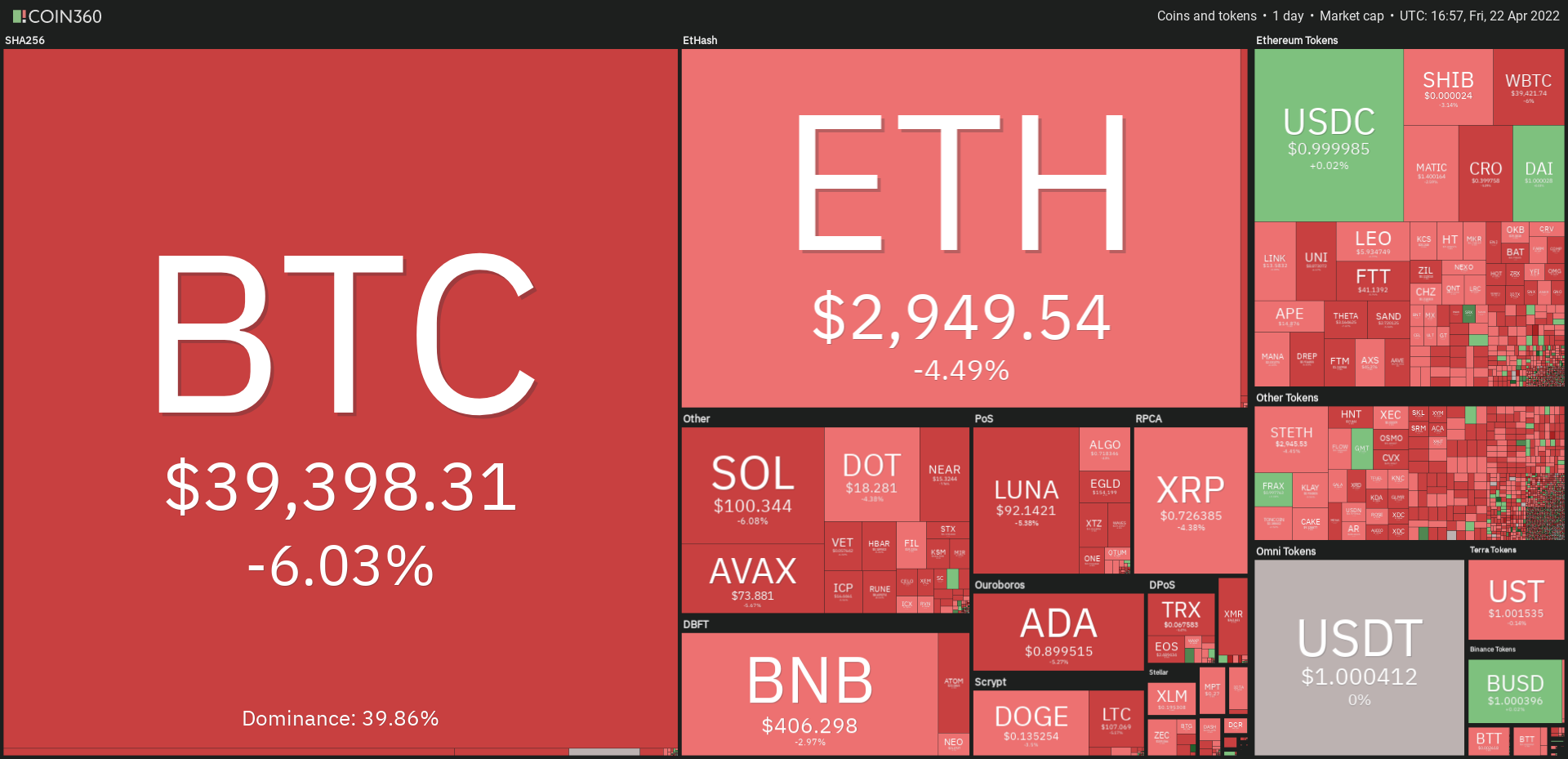 Daily cryptocurrency market performance. Source: Coin360
Daily cryptocurrency market performance. Source: Coin360
The subdued price action in cryptocurrencies and the weak-macro environment have resulted in reduced Google searches for the terms Bitcoin and Ethereum. Even crypto trading volumes have been in a declining trend for some time. According to Blockchain.com, the total exchange volumes on major crypto exchanges plunged to $165.8 billion on April 19, the lowest level since October 2020.
Could Bitcoin and altcoins continue their downward move or is it time for a relief rally? Let’s study the charts of the top-10 cryptocurrencies to find out.
BTC/USDT
Bitcoin broke above the 50-day simple moving average (SMA) ($41,977) on April 21 but the bulls could not sustain the higher levels as seen from the long wick on the day’s candlestick. The price reversed direction from $42,976 and settled below the 20-day exponential moving average (EMA) ($41,478).
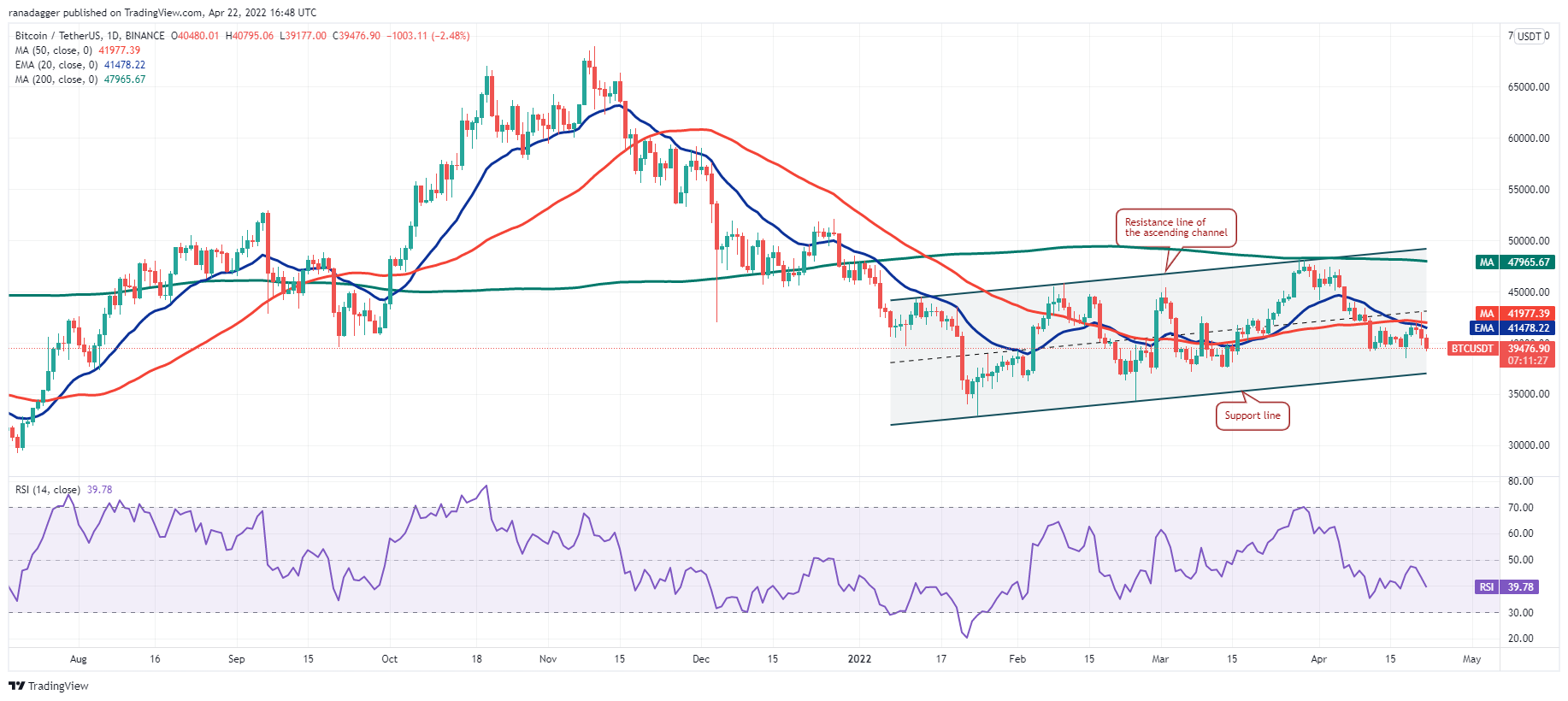 BTC/USDT daily chart. Source: TradingView
BTC/USDT daily chart. Source: TradingView
The selling continued on April 22 and the bears are attempting to pull the price down to the support line of the ascending channel pattern. The downsloping 20-day EMA and the relative strength index (RSI) in the negative zone suggest that bears have the upper hand.
If the price breaks below the support line of the channel, the selling could intensify and the BTC/USDT pair could drop to $33,000.
Conversely, if the price turns up from the current level or the support line, it will suggest that bulls are actively buying at lower levels.
The bulls will have to push and sustain the price above $43,000 to signal strength. The pair could then rise to the 200-day SMA ($47,965) and later challenge the resistance line of the channel.
ETH/USDT
Ether (ETH) has been stuck between the 20-day EMA ($3,087) and the 50-day SMA ($3,003) for the past few days. Several efforts to break out of this tight range have been unsuccessful, which suggests that bulls are buying on dips while bears are selling on rallies.
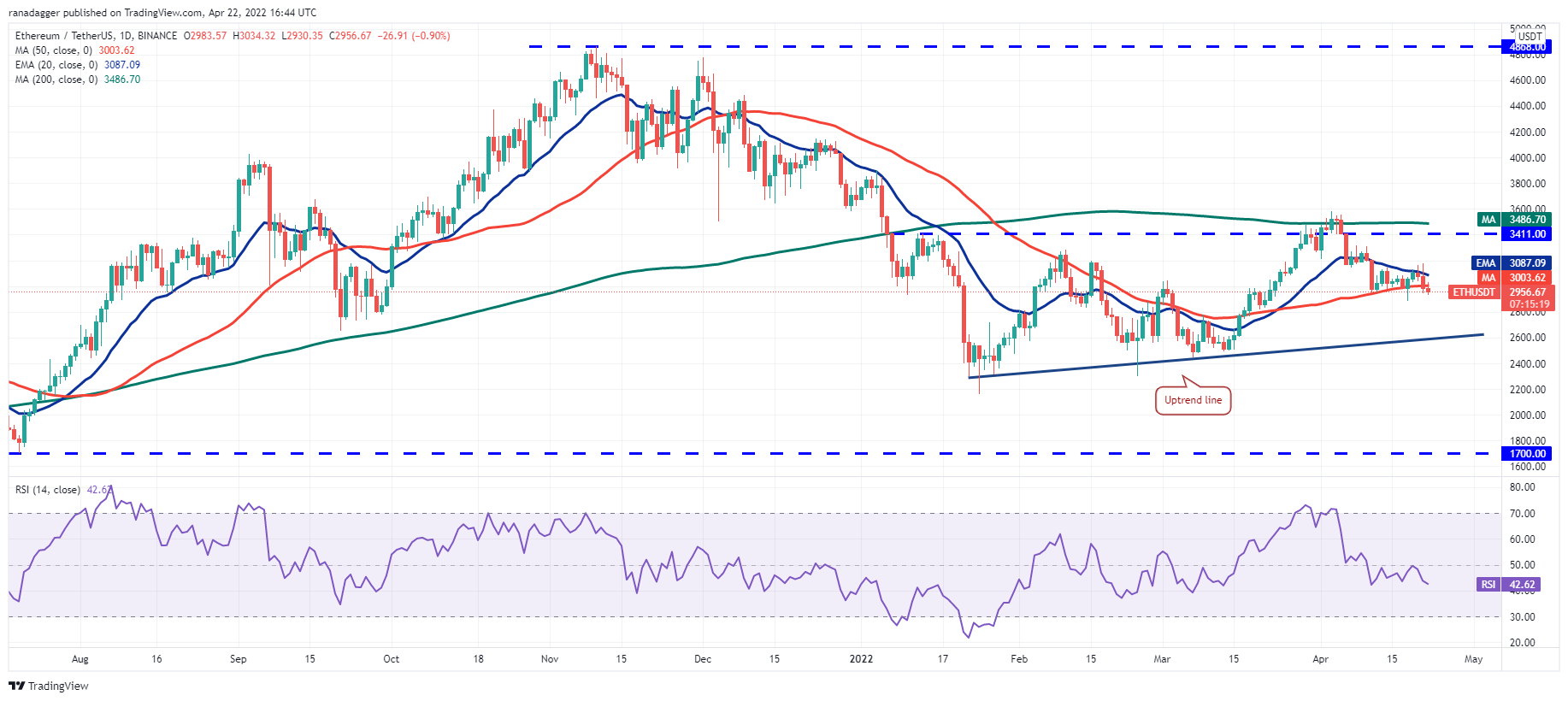 ETH/USDT daily chart. Source: TradingView
ETH/USDT daily chart. Source: TradingView
The downsloping 20-day EMA and the RSI in the negative territory give a slight edge to the sellers. If the price slips below $2,883, the possibility of a drop to the uptrend line of the developing ascending triangle pattern increases.
The bulls are likely to mount a strong defense at this level. If the price rebounds off the uptrend line, the buyers will make another effort to propel the ETH/USDT pair above the 20-day EMA.
If they succeed, the pair could rally to the 200-day SMA ($3,486). A break and close above this level will complete the ascending triangle pattern, resulting in a potential trend change.
BNB/USDT
The long wick on the April 20 candlestick shows that bears are selling on rallies near the overhead resistance at $445. BNB continued to move down and broke below the 50-day SMA ($408) on April 21.
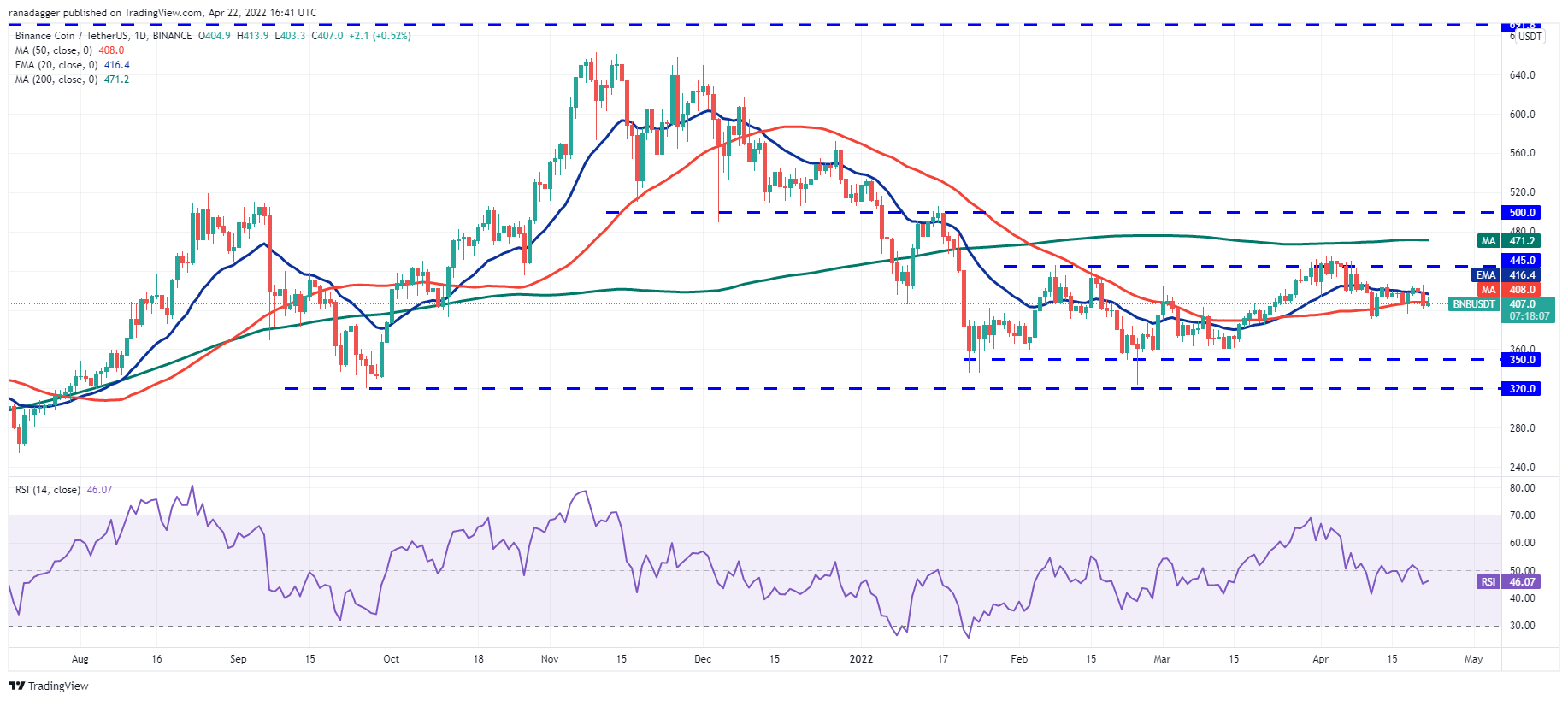 BNB/USDT daily chart. Source: TradingView
BNB/USDT daily chart. Source: TradingView
If bears sink the price below $391, the selling could accelerate and the BNB/USDT pair may drop to the strong support at $350. If the price rebounds off this level with strength, it will suggest that the pair could remain range-bound between $350 and the 200-day SMA ($471) for some more time.
Alternatively, if the price rebounds off the strong support zone between the 50-day SMA ($408) and $391, the bulls will endeavor to drive the pair to $445 and then to the 200-day SMA. A break and close above this level could signal a potential trend change.
XRP/USDT
Ripple (XRP) has been stuck in a range between $0.69 and $0.91 for the past few days. Although the price rebounded off the support of the range on April 12, the bulls could not clear the overhead hurdle at the 50-day SMA ($0.78), indicating a lack of demand at higher levels.
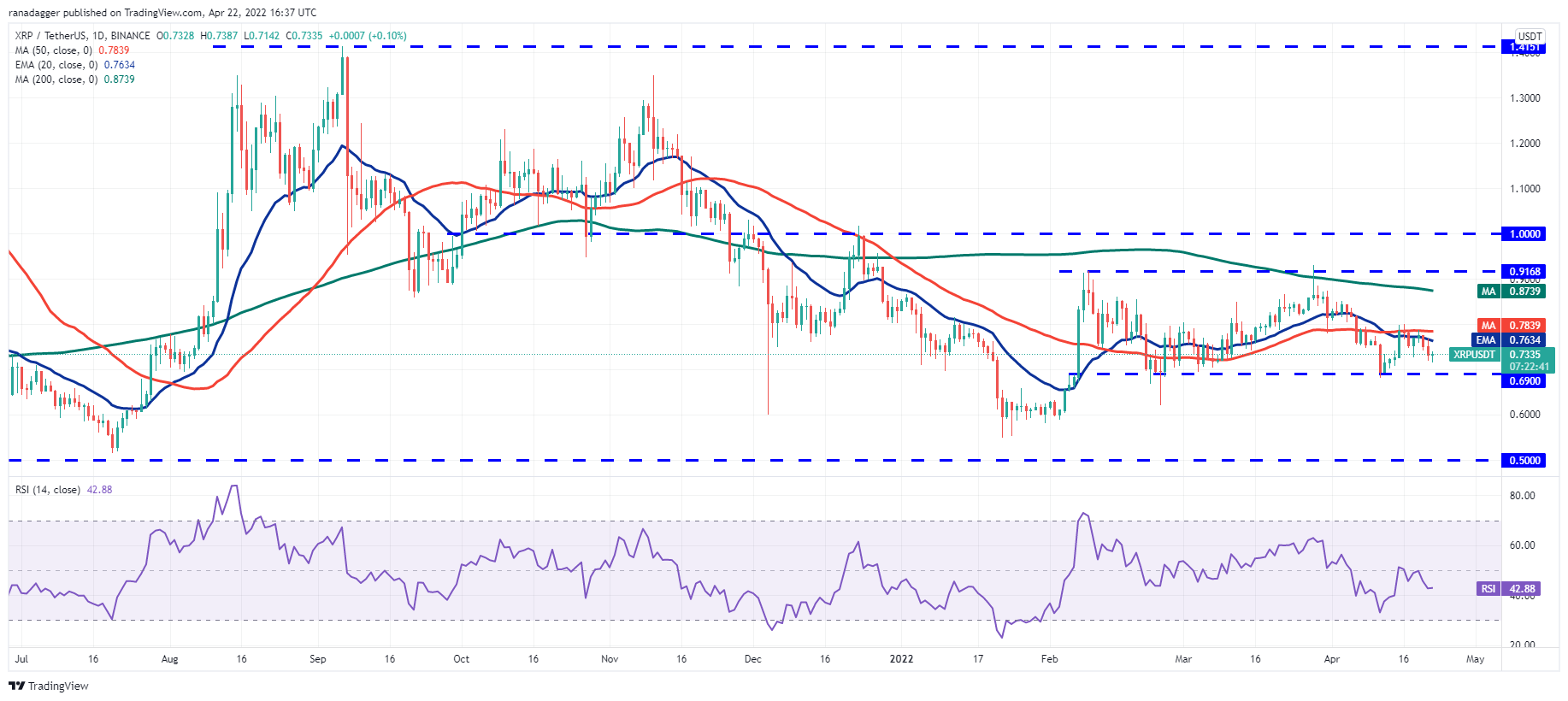 XRP/USDT daily chart. Source: TradingView
XRP/USDT daily chart. Source: TradingView
The bears will now strive to pull the XRP/USDT pair below the $0.69 support. If they manage to do that, the pair could drop to $0.62 and later to $0.54. The 20-day EMA ($0.76) has started to turn down and the RSI is in the negative zone, suggesting that the path of least resistance is to the downside.
Alternatively, if the price rebounds off $0.69 with force, it will indicate strong accumulation by the bulls. The buyers will then again try to overcome the overhead barrier at $0.80 and push the pair to $0.91.
SOL/USDT
Solana (SOL) broke above the 20-day EMA ($105) on April 19 but the bulls could not sustain the higher levels. The bears pulled the price back below the 20-day EMA on April 20.
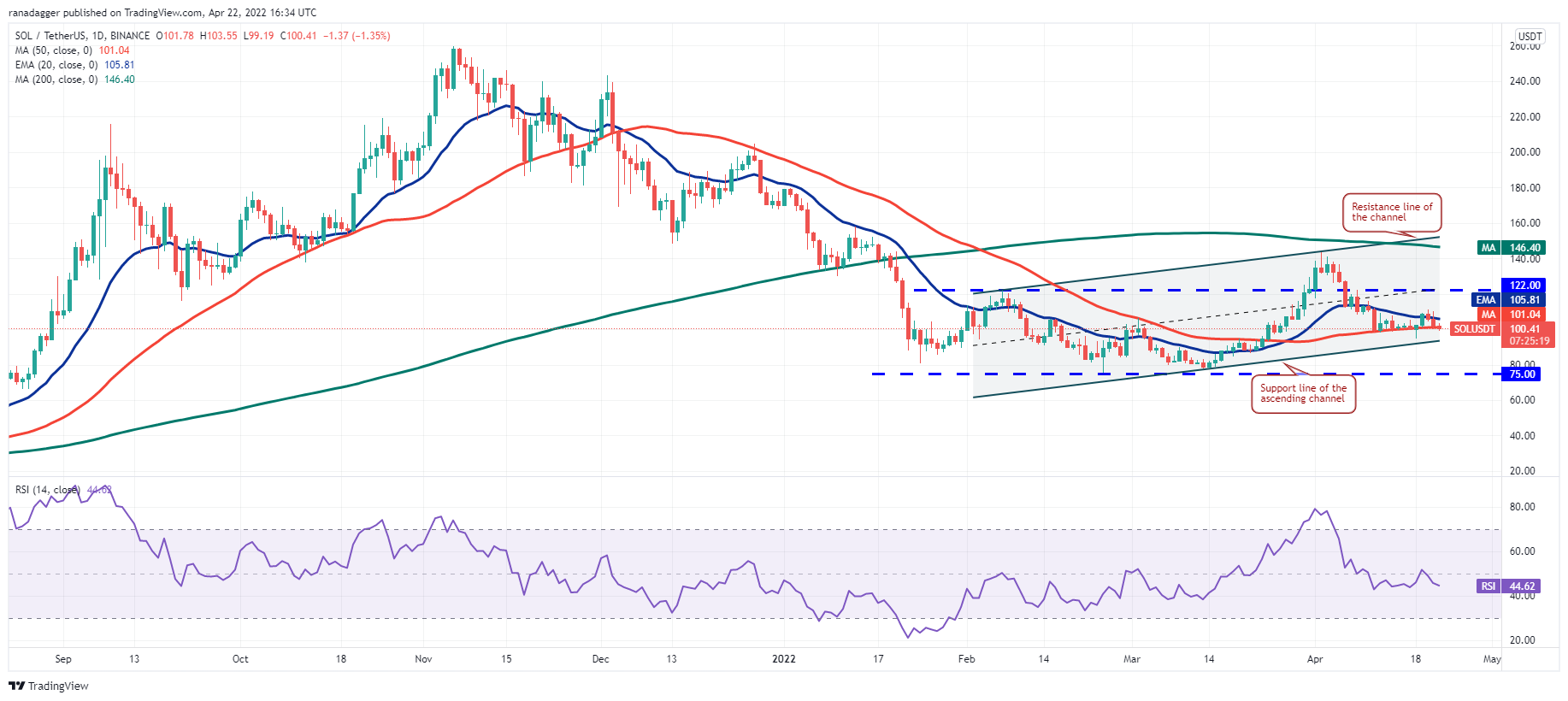 SOL/USDT daily chart. Source: TradingView
SOL/USDT daily chart. Source: TradingView
The selling has continued and the bears are trying to sustain the price below the 50-day SMA ($101). If that happens, the SOL/USDT pair could drop to the support line of the ascending channel. This is an important level to keep an eye on because if it gives way, the pair could drop to the strong support at $75.
Contrary to this assumption, if the price bounces off the current level or the support line of the channel, the buyers will again try to push the pair above $111. If they can pull it off, the pair could rally to $122.
ADA/USDT
Cardano (ADA) has been consolidating in a downtrend. The price turned down from the 50-day SMA ($0.97) on April 21, indicating that the bears are aggressively defending the overhead resistance at $1.
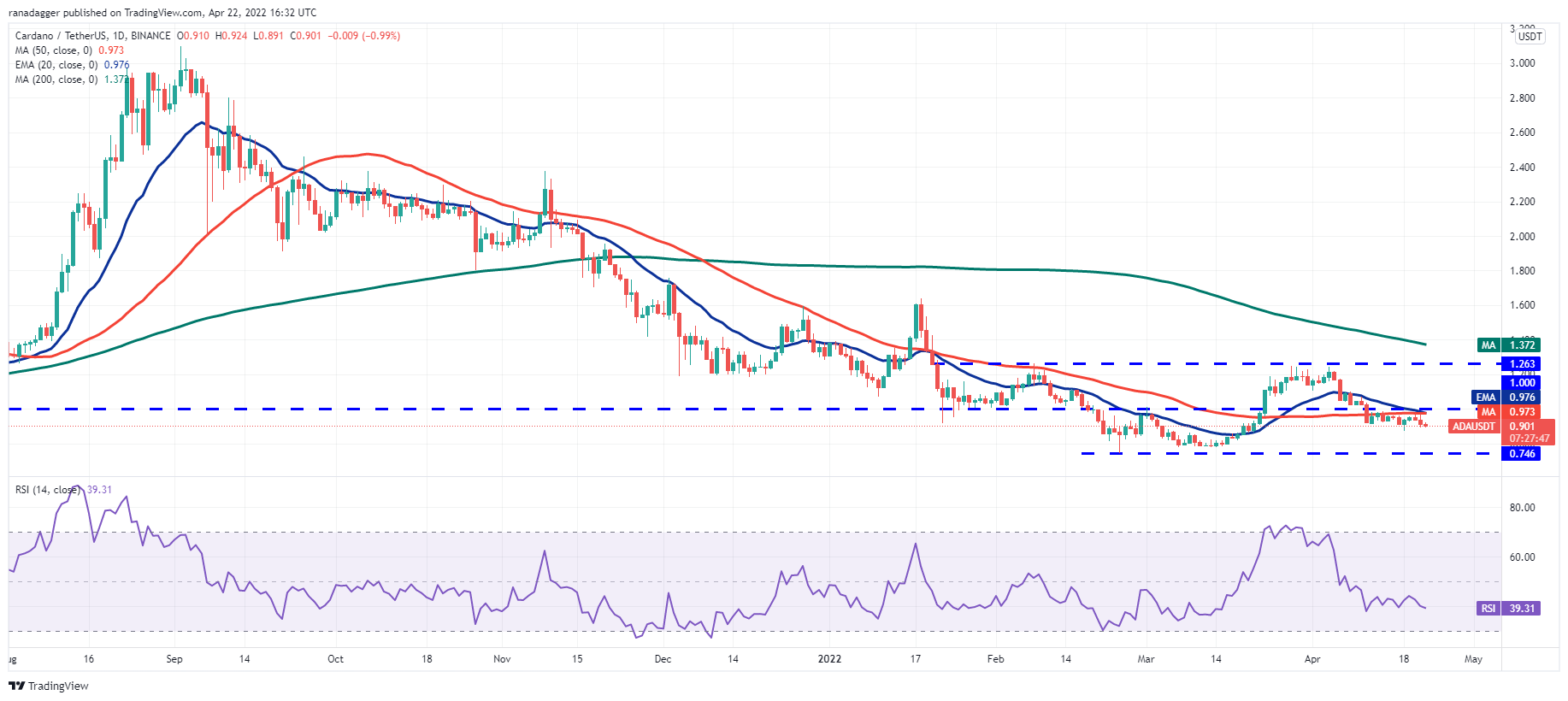 ADA/USDT daily chart. Source: TradingView
ADA/USDT daily chart. Source: TradingView
The downsloping 20-day EMA ($0.97) and the RSI below 40 indicate that bears have the upper hand. If sellers sink the price below $0.87, the selling could pick up momentum and the ADA/USDT pair could drop to the critical support at $0.74. This is an important level for the bulls to defend because if it cracks, the downtrend may resume.
The bulls will have to push and sustain the price above $1 to indicate that the bears may be losing their grip. The pair could then rise to $1.10 and later attempt a rally to the stiff overhead resistance at $1.26.
LUNA/USDT
Terra’s LUNA token turned down from the psychological resistance at $100 on April 21 but a minor positive is that the bulls have not allowed the price to sustain below the 20-day EMA ($91).
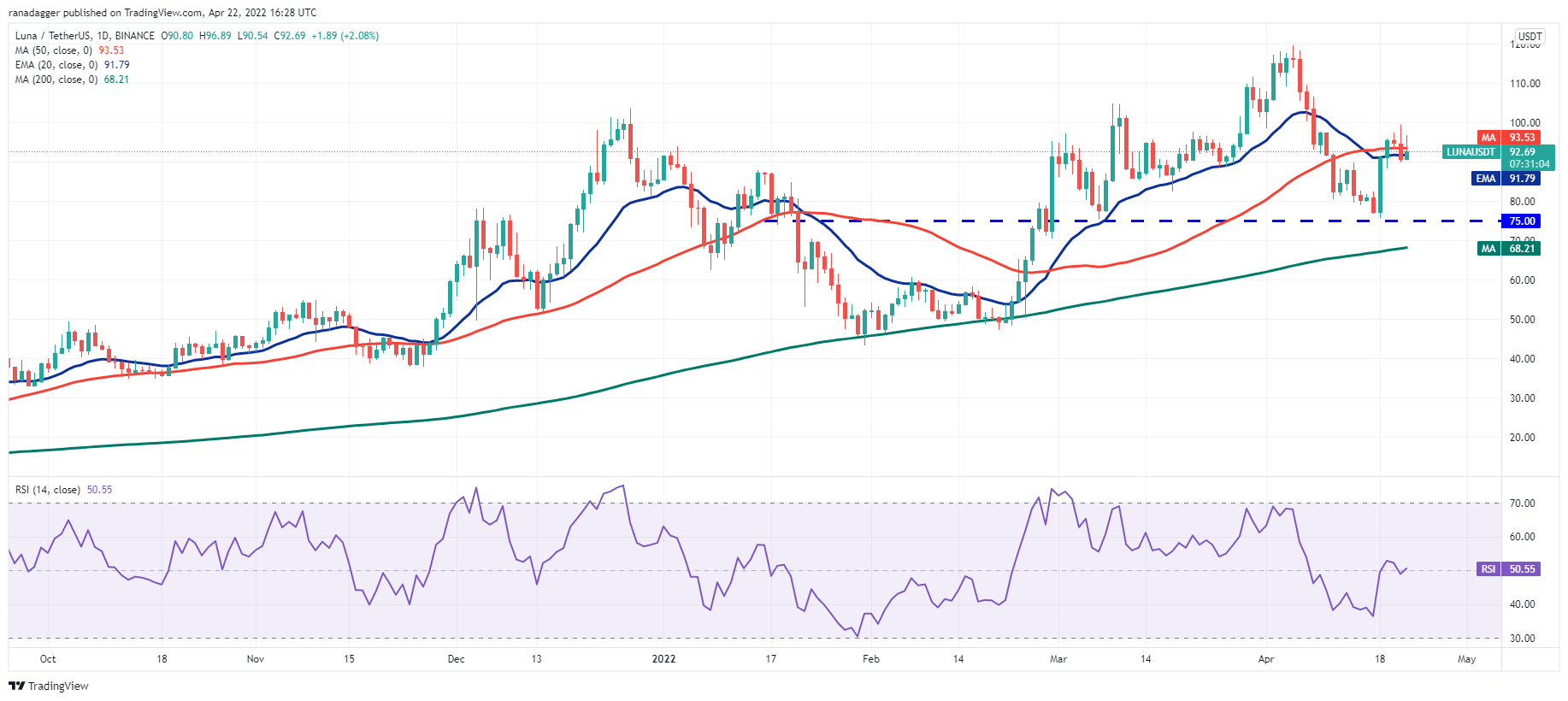 LUNA/USDT daily chart. Source: TradingView
LUNA/USDT daily chart. Source: TradingView
The buyers will now again attempt to push the LUNA/USDT pair above $100. If that happens, the bullish momentum could pick up and the pair may rally toward the all-time high at $119. The bears are likely to mount a strong defense at this level.
On the other hand, if the price turns down from the current level or the overhead resistance at $100, the prospects of a break below the support at $88 increase. If the price sustains below this level, the pair could drop to the strong support at $75. A break and close below the 200-day SMA ($68) could signal a potential trend change.
Related: Bitcoin follows fresh US stocks dive as analysis ‘expects’ BTC price to take $37.5K liquidity
AVAX/USDT
Avalanche (AVAX) had been trading between the 20-day EMA ($80) and the uptrend line for the past few days. Usually, such tight-range trading results in a sharp trending move.
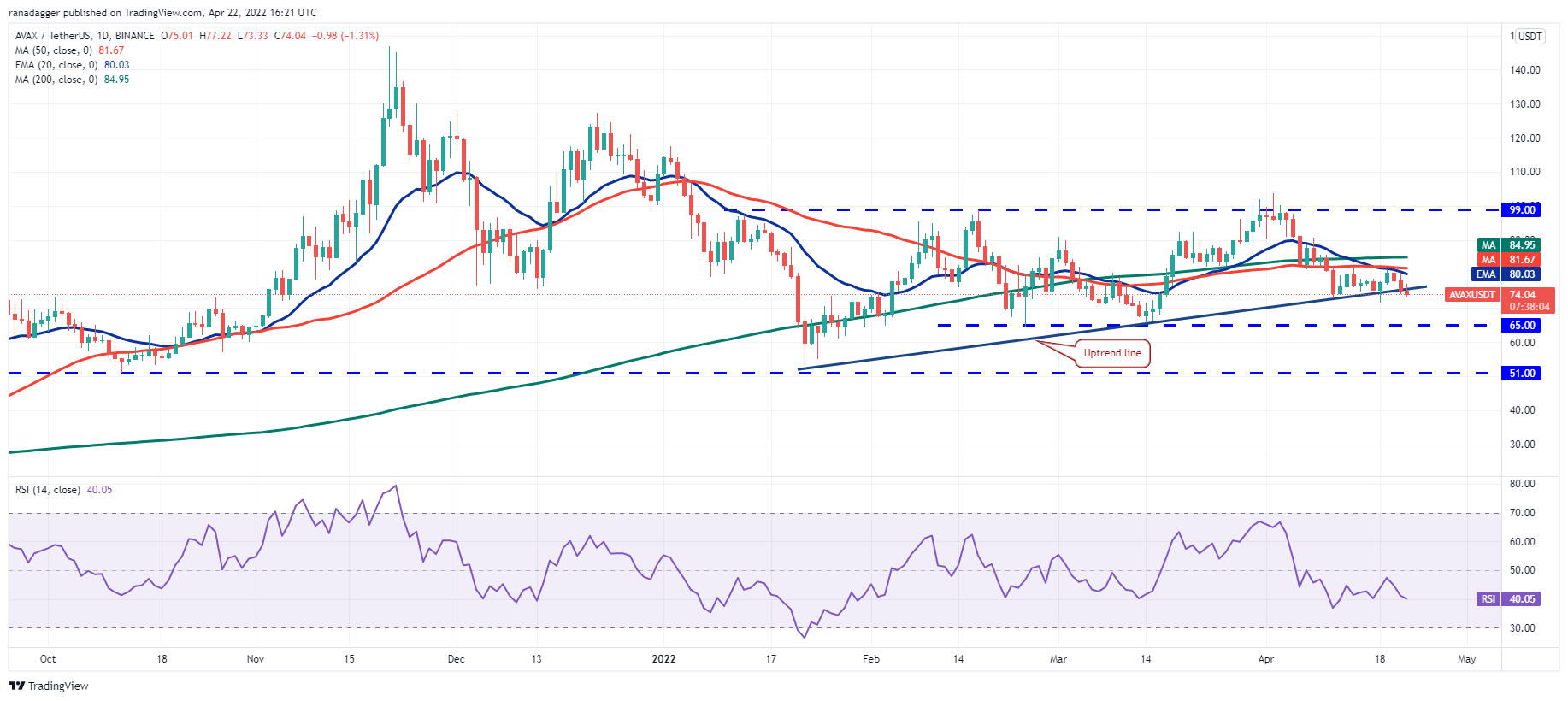 AVAX/USDT daily chart. Source: TradingView
AVAX/USDT daily chart. Source: TradingView
The downsloping 20-day EMA and the RSI in the negative territory indicate that bears have an edge. If the price sustains below the uptrend line, the developing ascending triangle pattern will invalidate. That could sink the AVAX/USDT pair to the strong support at $65.
Alternatively, if the pair rises from the current level, the buyers will make one more attempt to push the price above the moving averages. If they succeed, the pair could rally to the overhead resistance zone at $99 to $104.
DOGE/USDT
Dogecoin (DOGE) has been range-bound in a downtrend. The price turned down from $0.15 on April 20 and plunged to the 50-day SMA ($0.13) on April 21. This suggests that demand dries up at higher levels.
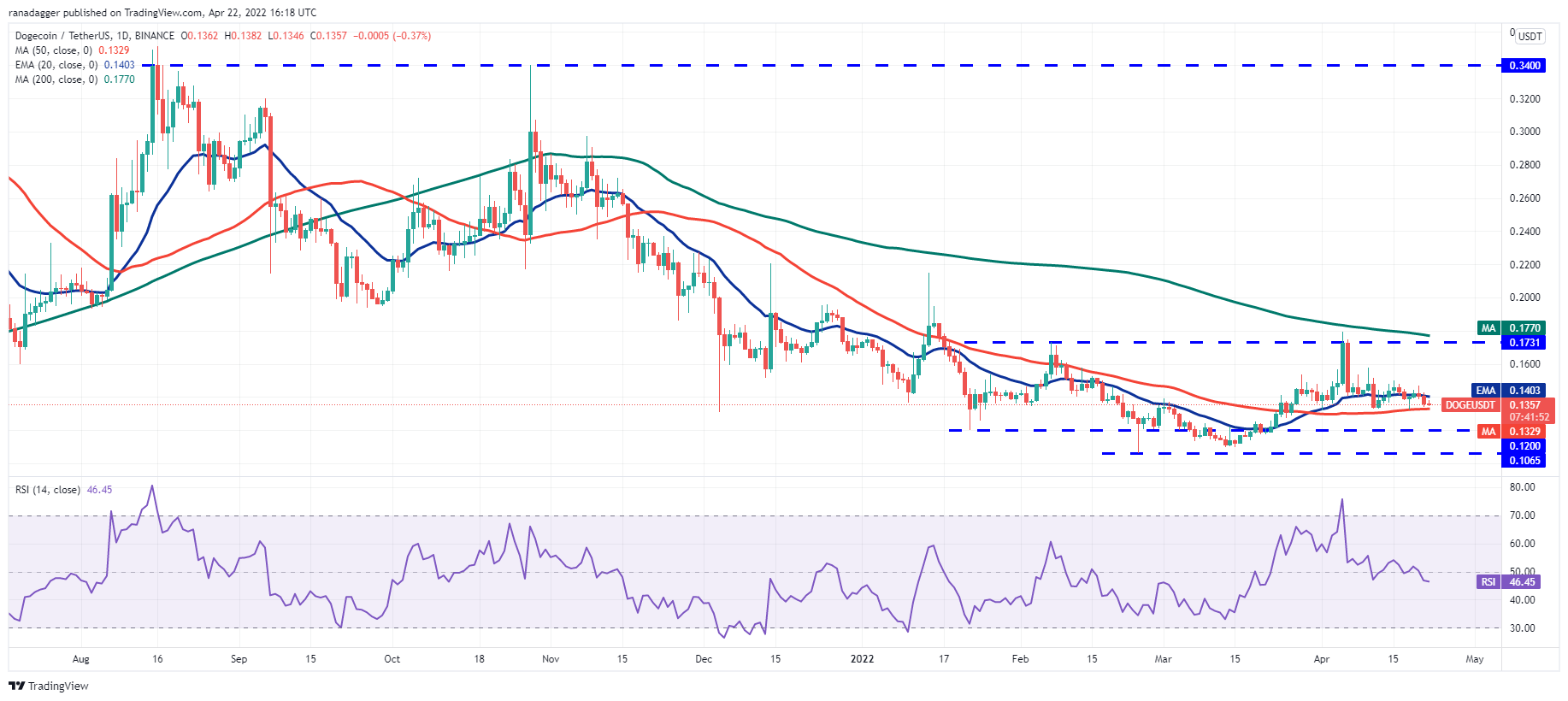 DOGE/USDT daily chart. Source: TradingView
DOGE/USDT daily chart. Source: TradingView
The repeated retest of a support level tends to weaken it. If the price breaks below the 50-day SMA, the bears will attempt to pull the DOGE/USDT pair to the strong support at $0.12. The bulls are expected to defend this level with vigor but if the support gives way, the decline could extend to the critical level at $0.10.
On the contrary, if the price rebounds off the 50-day SMA, the bulls will try to push the pair above the overhead resistance at $0.15. If they manage to do that, the pair could rise to the overhead resistance at $0.17.
DOT/USDT
Polkadot (DOT) has been range-bound inside a large range between $16 and $23 for the past several days. The bulls pushed the price above the 50-day SMA ($19) on April 20 and 21 but could not sustain the higher levels.
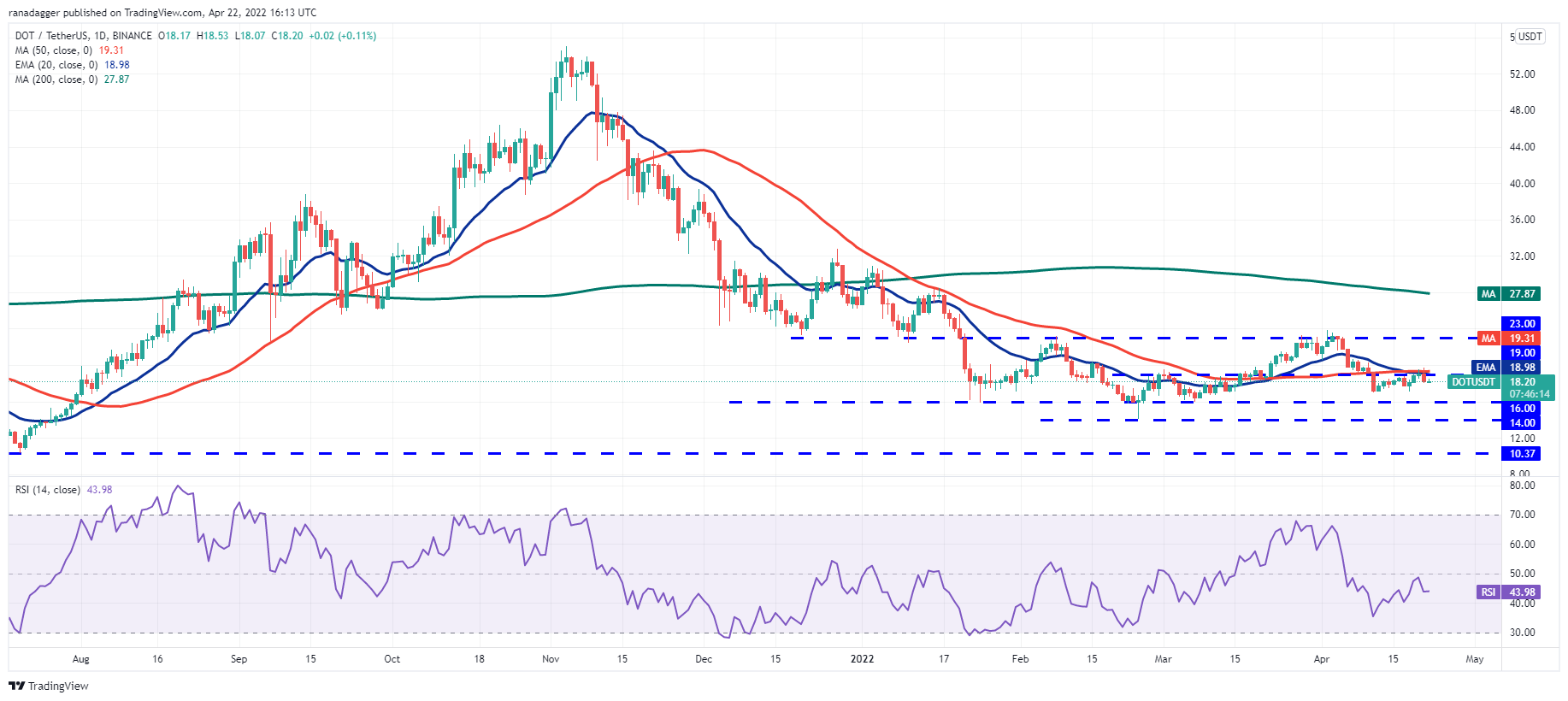 DOT/USDT daily chart. Source: TradingView
DOT/USDT daily chart. Source: TradingView
This suggests that bears are selling on rallies. If the price slips below the immediate support at $18, the DOT/USDT pair could decline to $17. The gradually downsloping 20-day EMA ($19) and the RSI just below the midpoint suggest a slight advantage to sellers.
Alternatively, if bulls push and sustain the price above the 50-day SMA, the pair could attempt a rally to the overhead resistance at $23. The bulls will have to clear this hurdle to suggest the start of a new up-move.
The views and opinions expressed here are solely those of the author and do not necessarily reflect the views of Cointelegraph. Every investment and trading move involves risk. You should conduct your own research when making a decision.
Market data is provided by HitBTC exchange.






